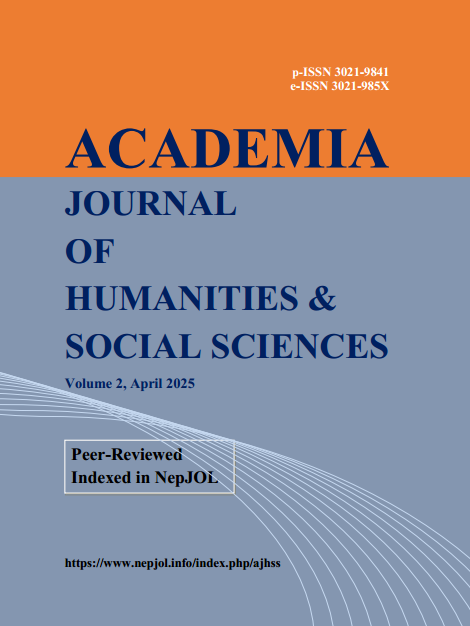The Use of Rustic and Colloquial Language in Pashupati Sharma’s “Dohori” [Folk] Songs
DOI:
https://doi.org/10.3126/ajhss.v2i1.77171Keywords:
Folk songs, Dohori, rustic language, colloquial languageAbstract
This paper investigates the use of the rustic and colloquial words or expression in the Nepali “Dohori” [folk] songs sung by Nepali “Dohori” singer Pashupati Sharma. It further explores the major causes for using such language. To address these issues, the study employs a qualitative based descriptive approach along with the casual interview as the tools for data collection. In the study, nine “Dohori” songs of the chosen singer who used rustic and colloquial language are used for analysis. They include “Kyarna Maya Maricheu Mayale” [Why have you forgotten me, my love?], “Duita Hatti” [Two Elephants], “Roila Dohori [Roila folk], Cycle Kinna Jam” [Lets go to buy a bicycle], “Lauri Haraayo” [Stick got lost], “Jantai Jaamla Bhaterai Khaamla” [Will go to wedding ceremony and have the feast], “Maaya Laako ho Bhana” [Say, love is there], “Pani Puri” [A type of food] and “Chatta Lokal Kukhura” [Yes, Local Chicken]. The songs for analysis are taken from the official YouTube channel of Sharma. The singer himself, a Nepali Language teacher and two fans of Pashupati Sharma were interviewed to find out the reasons for the use of colloquial language in Nepali folk songs. The result shows that most of the listeners of the folk songs are from rural area who basically prefer to enjoy the use of colloquial Nepali language of their area in the songs. Nepali folk songs have played an important role to protect the folk culture in the country but sometimes in the name of attracting the listeners by the use of rustic and colloquial expressions in the songs, there is a fear that formal Nepali language is likely to be overshadowed.





